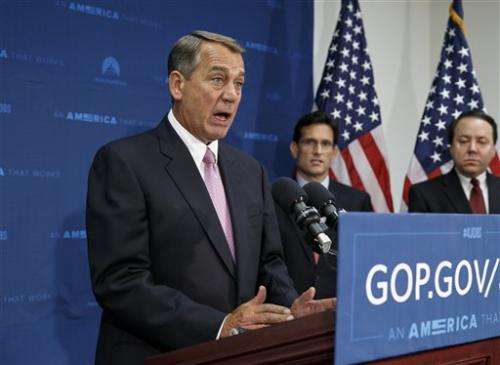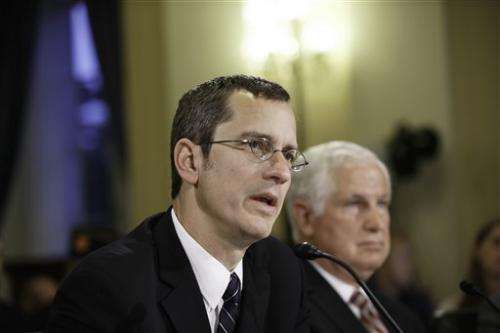House Speaker John Boehner of Ohio, joined by House Majority Leader Eric Cantor, R-Va., center, and Rep. Pat Tiberi, R-Ohio, talks to reporters on Capitol Hill in Washington, Tuesday, June 10, 2014, after a Republican Conference meeting. Commenting on problems with the troubled health care system in the Department of Veterans Affairs, Boehner said, "We have a systemic failure of an entire department of our government." (AP Photo/J. Scott Applewhite)
The U.S. House overwhelmingly approved legislation Tuesday to make it easier for patients enduring long waits for care at Veterans Affairs facilities to get VA-paid treatment from local doctors.
The 426-0 final vote was Congress' strongest response yet to the outcry over backlogs and falsified data at the beleaguered agency. Senate leaders plan debate soon on a similar, broader package that has also drawn bipartisan support, underscoring how politically toxic it could be to be seen as ignoring the problem.
House members didn't want to be left out of their roll call. An unusual second vote, superseding the chamber's 421-0 passage of the bill barely an hour earlier, was taken after a handful of lawmakers missed the first one.
The controversy led Eric Shinseki to resign as head of the VA on May 30, but the situation remains a continuing embarrassment for President Barack Obama and a potential political liability for congressional Democrats seeking re-election in November.
The VA, which serves almost 9 million veterans, has been reeling from mounting evidence that workers fabricated statistics on patients' waits for medical appointments in an effort to mask frequent, long delays. A VA audit this week showed that more than 57,000 new applicants for care have had to wait at least three months for initial appointments.
Philip Matkovsky, who helps oversee the VA's administrative operations, said of patients' long waits and efforts to hide them, "It is irresponsible, it is indefensible, and it is unacceptable. I apologize to our veterans, their families and their loved ones."
Philip Matkovsky, assistant deputy under secretary for health for administrative operations at the Department of Veterans Affairs, joined at right by Richard J. Griffin, acting inspector general for the Department of Veterans Affairs, testifies as the House Committee on Veterans' Affairs holds a hearing to examine why thousands of military veterans have been waiting for up to three months for medical appointments, on Capitol Hill in Washington, Monday, June 9, 2014. (AP Photo/J. Scott Applewhite)
Matkovsky did not specify which VA officials had questionable integrity. The agency has started removing top officials at its medical facility in Phoenix, a focal point of the department's problems, and investigators have found indications of long waits and falsified records of patients' appointments at many other facilities.
Richard Griffin, acting VA inspector general, told lawmakers his investigators were probing for wrongdoing at 69 agency medical facilities, up from 42 two weeks ago. He said he has discussed evidence of manipulated data with the Justice Department, which he said was still considering whether crimes occurred.
The VA drew intensified public attention two months ago with reports of patients dying while awaiting agency care and of cover-ups at a center in Arizona. The VA, the country's largest health care provider, serves almost 9 million veterans.
The House bill would let veterans facing long delays for appointments or living more than 40 miles (65 kilometers) from a VA facility to choose to get care from non-agency providers for the next two years. A relative few vets already have that option for outside care, and this would expand the offer.
The bill also would ban bonuses for all VA employees through 2016 and require an independent audit of agency health care. An earlier House-passed bill would make it easier to fire top VA officials.
Senators have written a similar bill, which Senate Majority Leader Harry Reid, a Democrat, said his chamber will consider "as soon as it is ready."
On Monday, the VA released an internal audit showing more than 57,000 new patients had to wait at least three months for initial appointments. It also found that over the past decade, nearly 64,000 newly enrolled veterans requesting appointments never got them, though it was unclear how many still wanted VA care.
© 2014 The Associated Press. All rights reserved.





















